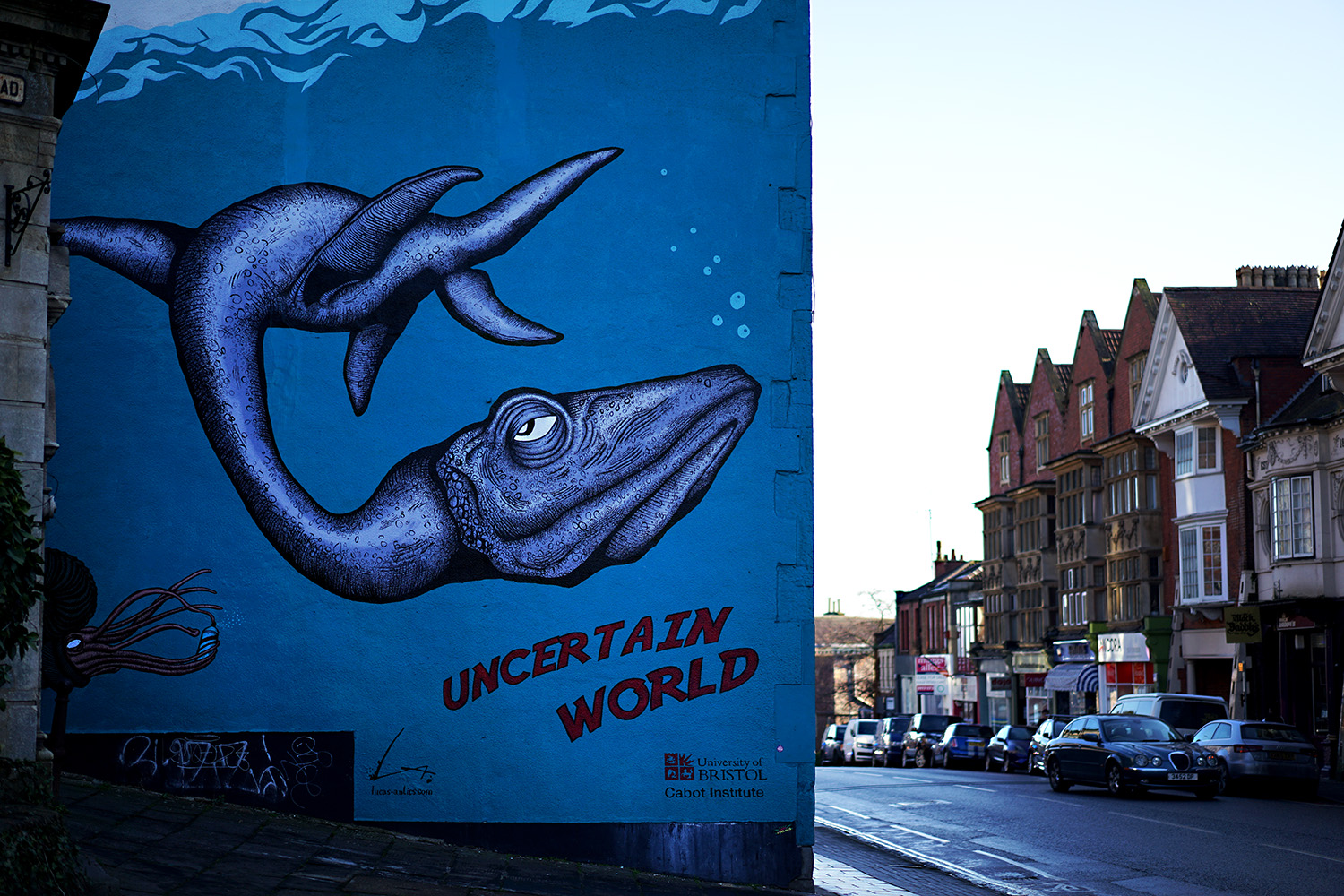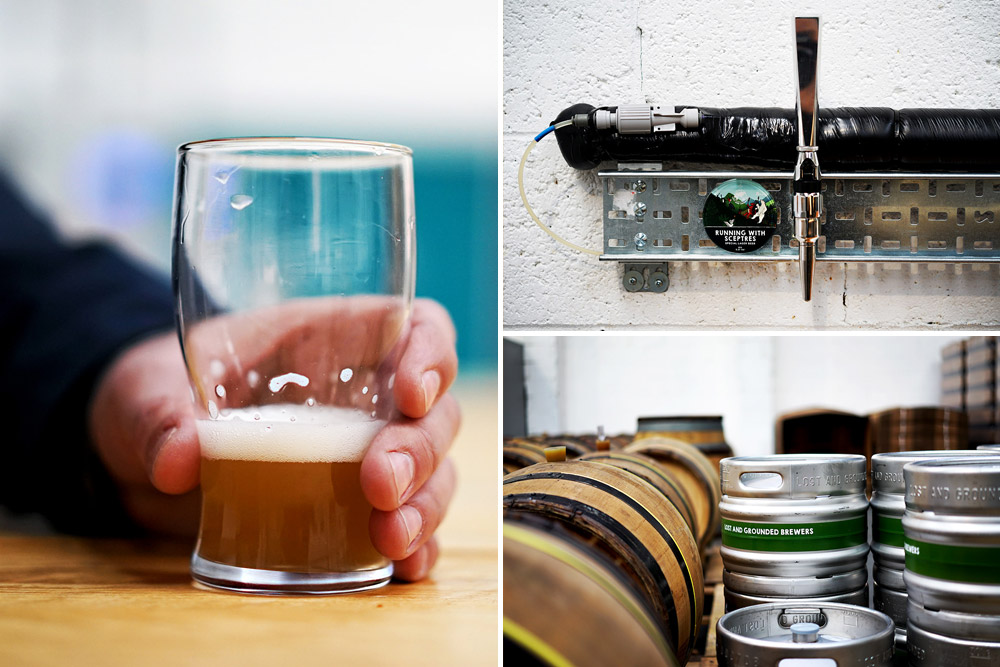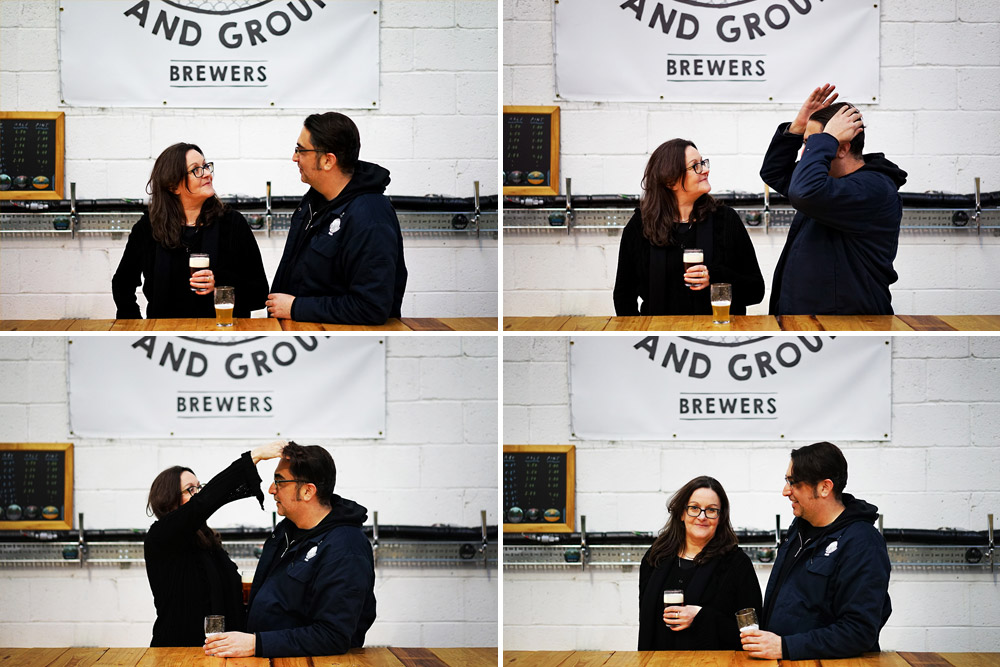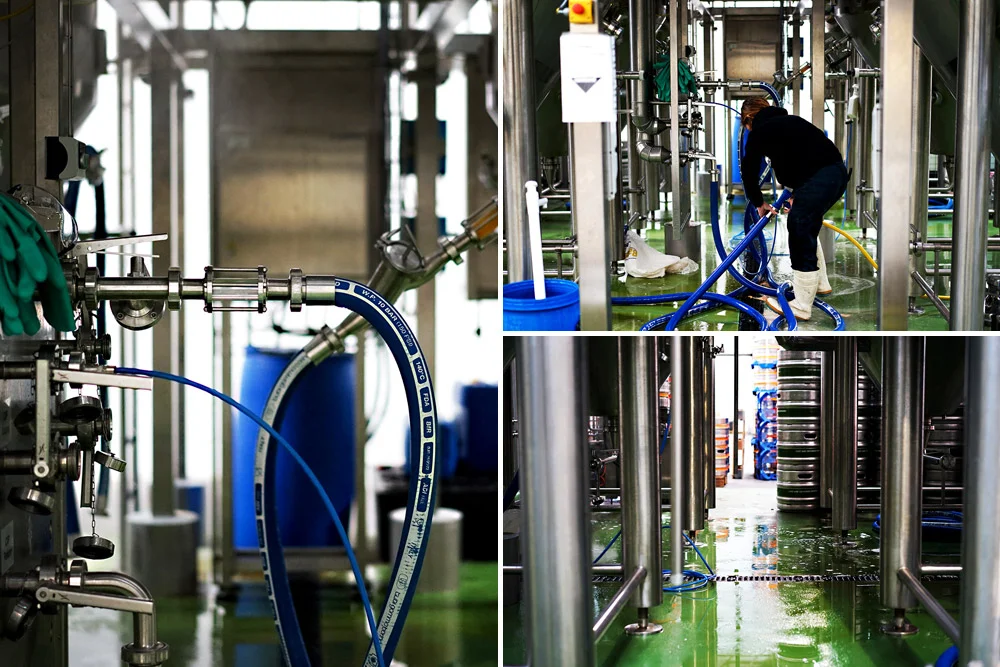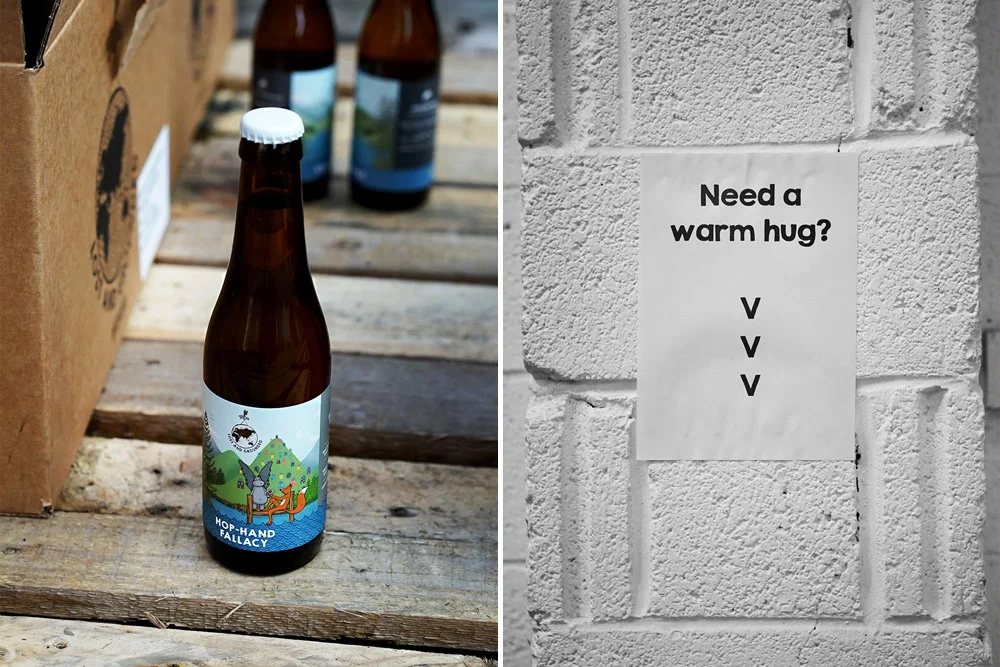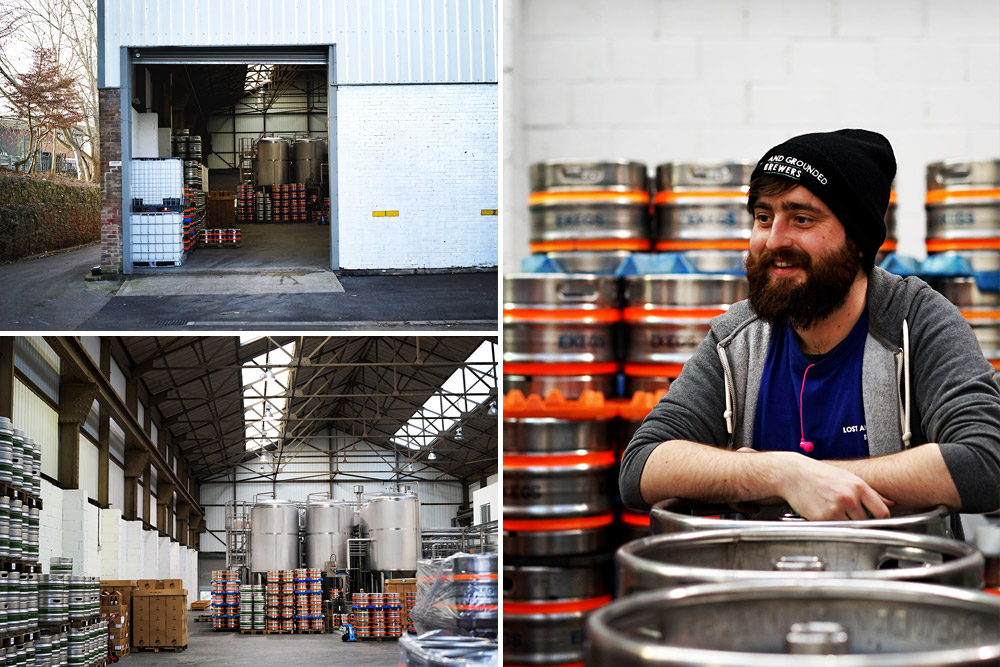Bristol is a city that’s located in the southwest of England in a region known colloquially as The West Country. It’s well connected by road and rail, and it only takes about two hours to get there by train from London. Bristol’s known in the UK for its laid back, liberal attitude: baggy clothing and tie-dye shirts are something of a uniform among its creative set. It’s also home to two large universities, meaning that, for most of the year, this town—which, on the surface, is seemingly easy-going and quiet—is home to a relatively young population.
Many former students have since settled in Bristol, making it their home. The city is also a draw to those in other urban centers such as London or Manchester hoping to eek out a slice of that chill West Country lifestyle for themselves. Those interested in the arts and music have often found themselves drawn here too, and that’s immediately apparent when you take in the colorful street art that litters the walls all over the city. Posters for jam nights and rock shows decorate pub walls. It’s a lot like the creative spirit you mind find Stateside in towns such as Asheville, North Carolina or Portland, Oregon.
And when the sun goes down, these folks like to party. Spend a moment strolling down King Street in the town center to get a feel for the buzzing vibe generated by the likes of Small Bar and The Beer Emporium. As a result, there’s an abundance of new beer makers both emerging and thriving. Amongst these is Lost and Grounded Brewers.
Bristol is no stranger to breweries. The Bristol Beer Factory, established in 2004, began producing modern riffs on classic British styles and experimenting with increasingly aromatic American hop varieties. It even gave folks like Andrew Cooper and Brett Ellis—who would go on to found one of the UK’s fastest growing craft breweries, The Wild Beer Company in 2012—their start in the beer industry.
Moor Beer Company was founded by U.S. expat Justin Hawke in 2007, and this year they celebrate their 10th anniversary. Over the past decade, Hawke has become an outspoken figure in the British beer industry, especially when it comes to the use of isinglass finings in cask beer–which his brewery emphatically does not. Isinglass is a collagen made from the swim bladders of fish, such as sturgeon, which helps clear cask beer before serving. His vociferous opposition to the finings and subsequent promotion of Moor’s aromatic, hazy beer has not just helped put his brewery on the map but has bolstered Bristol’s claim as a town that’s serious about its beer.
“Bristol is a very open-minded, multicultural, progressive city, so consequently the people are really interested in things that are new, interesting, and high quality,” Hawke says. “It’s also a very socially conscious city, so things like localism are important. The geography of the city is perfect—it’s very compact, so you can walk nearly everywhere, and there are a variety of neighborhoods, all with different vibes.”
That attitude also means that Bristol is a city that’s welcoming to newcomers. But in terms of the UK’s large metropolitan areas, it’s also comparatively small, with a population of around 428,000—far less than London’s 8 million, or Greater Manchester’s 2.5 million. Bristol has seen a huge influx of breweries in and around the city over the past 10 years, including Arbor, Left Handed Giant and Wiper & True. This increased competition doesn’t seem to bother Hawke, though. In fact, when Lost & Grounded established itself here 2015, he welcomed Troncoso and Clements to the town with open arms.
“We were really good personal friends with Alex and Annie before they moved here—and still are,” he says. “Like us, they’re foreigners who fell in love with the city and wanted to bring something different to it. We brought Modern Real Ale. They brought modern German and Belgian styles. I love their Keller Pils and think every place in the UK should stock it as their house Lager.”
Alex Troncoso, Annie Clements and I are chatting in a small room, eyeing the fancy 25-HL (21-BBL) German-manufactured brewhouse in the warehouse opposite us, while sipping on glasses of Lost and Grounded’s house beer, Keller Pils. Troncoso is musing on how they ended up here.
“We were actually looking at moving to Liverpool originally and building a brewery up there,” he says. “Then we came to Bristol one day and just thought, ‘Ah, it kind of reminds us a little of Australia—everyone’s kinda laid back here.’”
Keller Pils is one of two Lagers in Lost and Grounded’s core range, which, unusually—and perhaps bravely, giving to their current popularity—for a modern British brewery, doesn’t include a single Pale Ale or IPA. This German-inspired, unfiltered Pilsner pours a touch hazy in the glass and snaps with the herbal bite of noble hops before being rounded out with bready malts and a soft, dry finish. It’s eminently crushable, as is the brewery’s U.S.-hopped “special” Lager, Running with Sceptres. The latter bursts with notes of tropical and citrus fruits while possessing very little in the way of bitterness.
These German-leaning styles that lead Lost and Grounded’s portfolio are joined by beers including Hop-Hand Fallacy, a Belgian-influenced Farmhouse Ale, and No Rest for Dancers, a Dubbel masquerading on tap lists as a Red Ale. Although the influences in Lost and Grounded’s beers are clear, they also each have a point of difference that sets them apart.
The German-inspired lactic acid propagation tank that sits next to the main brewhouse is the perfect example of this. This tank is fed fresh wort weekly and soured with lactobacillus before being used to precisely dial in the pH of each brew. As far as Troncoso and Clements are aware, it’s the only one of its kind in use in the U.K.
“Everything we do should have an unexpected quality about it,” Troncoso says as he leads a tour. “We came up with these four words: ‘humble, inclusive, clever, and raw,’ and they were the four words that we chose to define ourselves with.”
German manufacturer Krones designed and built the 25-HL “Microcube” system at the heart of Lost and Grounded’s brewery. Its twisting network of hard-piped stainless steel and large, sleek brewing vessels is like something straight out of a steampunk fantasy. At the time of its construction it was only the fourth such system that Krones had manufactured. Typically, the German brewing equipment giant is used to designing much larger systems. These include Camden Town’s brand new 200,000-HL (170,000-BBL) capacity brewery that opened recently in North London.
For a couple that had never even bought a house before, investing in a brewery, which involved spending almost every cent they had to their name, was a daunting prospect. Fortunately, they had a little help from their friends and former co-workers who previously owned Australian brewery Little Creatures.
“We let the guys know we were opening a brewery,” Clements says. “They’ve always been incredible mentors to Alex and still are. They were like, ‘Show us what you got!’”
Howard Cearns, one of Little Creatures original founders, says he had no reason to hesitate.
“[Alex’s] vision for developing a superb Keller Pils style, his undoubted skills and passion, and the combination of brand smarts with Annie led us to being more than keen to support his own brewery dream,” Cearns says. “There’s space in the market for this unique style and having that flagship product vision is probably the key part of the plan that attracted us.”
“There are good craft brewers out there and then there are ‘next level’ craft brewers who have the experience and skill set to ensure beers of an extremely high quality and consistency can get to the consumer,” he continues. “Alex is one of those.”
At Lost and Grounded, everything from the configuration of the brewhouse to the design of the fermentation vessels and the layout of the brewery itself is testament to Troncoso’s vast engineering experience. It’s no doubt the stuff he once dreamed of doing when sneaking in the back of AC Golden for a beer while studying in Colorado. Now it’s very much a reality, and for Clements and Troncoso, that means that they can design the beers they want to enjoy to their own, exacting specifications.
If you had told Troncoso and Clements shortly after they met in Tasmania, Australia that, two decades later, they’d own their own brewery in Bristol, England, they probably would’ve laughed right in your face. But that meeting was the very moment where Lost and Grounded Brewers began. They’d have to actually get to the other side of the world first, though.
Alex Troncoso was born in Guatemala, but grew up in the U.S. At 16 he moved in with his father in Brisbane, Australia, but soon returned Stateside to study at the School of Mines in Golden, Colorado. There he earned an engineering degree in chemical and petroleum refining.
“The school was up the road from Coors, and on a Friday we’d do what was called ‘the short tour,’ which is when you go up the back stairs straight to the bar,” Troncoso says. “I think the tours were free anyway, but we’d skip that part and just go straight there for our three free beers and then head off.”
By the time he’d finished his degree, Troncoso had decided that he wanted to become a brewer. After working a summer at Foster’s in Sydney, he returned to Colorado and landed a job at a Denver brewery called Irons. He’d work there for a year while finishing his studies before moving back to Australia in 1997.
“I wanted a job in [Australian] brewing, but back then there were fuck all breweries here,” he says. “You had the Foster’s breweries, the Lion breweries and Cooper’s—that was basically it. I could never get a job in a brewery, so I restarted homebrewing, which I’d been doing in Colorado.”
There were a few emergent craft breweries in Australia at the time, such as Melbourne’s Mountain Goat, itself purchased by Asahi in 2015. But with the market being so young, brewing jobs were incredibly thin on the ground. Troncoso’s frustration when discussing the project is palpable but it wouldn’t be long before opportunity finally came knocking.
Clements originally hails from a small town on the island of Tasmania off the southern tip of Australia but was living in Melbourne around the time she met Troncoso. He was working in an iron ore mine on the island when Clements returned home to visit family when their paths aligned. The couple would move around Australia as Troncoso switched jobs, first to Brisbane, then Melbourne, all the time still searching for that ever-elusive beer industry gig. Eventually, Troncoso landed a position at a Melbourne brewery called Stockade, but it wasn’t quite what he was expecting.
“After applying for around 40 jobs, I finally got a job in a little brewery in Melbourne, only to spend half my time in the brewery and the other half making crème liqueur,” he recalls. “It was like torture for someone who spent 7 or 8 years trying to get a job in a brewery with constant rejections, only to start and have them say: ‘Here, can you make this crème liqueur?’”
After 6 months, another position came up at a small, young, and exciting brewery near Australia’s west coast called Little Creatures. (Now 17 years old, Little Creatures is currently part of the Lion group of breweries, itself a part of Japan’s Kirin.) It was make or break time for Clements and Troncoso.
“We ummed and ahhed at the time, I’d already dropped a lot in salary and the Little Creatures job was another drop with no relocation assistance besides two one way flights,” Troncoso says.
Clements is also quick to point out that relocating from Melbourne in South Australia to Perth on the west coast, involved moving more than 3000 miles away from what was home. Unperturbed, the couple pressed on towards this new opportunity and it would turn out to be one of the most valuable decisions they’d ever make. Little Creatures had been around for a few years when Troncoso first starting working as a shift brewer, but it was around this time that things really started to take off for the now-internationally-renowned Aussie brewery.
“The first year I worked there, we did about 14,000 HLs (12,000 BBLs),” Troncoso says. “The year I finished, we were doing about 100,000 (85,000 BBLs). And then we had another brewery, White Rabbit, doing 20,000 (17,000 BBLs) and we were building a third brewery in Geelong to do up to 400,000 (340,000 BBLs).”
Over the eight years Troncoso worked at Little Creatures, his role changed regularly. He went from shift brewer to brewing team leader, to project manager, to head brewer. His promotion came along every six months or so. Eventually, he was made the head of brewing development and spent almost three years planning and designing that 400,000-HL capacity Geelong-based brewery. Suddenly, that leap of faith the pair took a few years ago didn’t seem like the step into the unknown it once might have.
Little Creatures even funded Troncoso’s masters degree in business along with his diploma from the institute of brewing. The eventual takeover of the brewery by Kirin, though not entirely unexpected, still shook those working at the Aussie brewery with considerable force.
“Kirin always had a share, but it was always around 25%,” Troncoso says. “We always knew it would be coming at some point in time, but we just speculated as to when that might be. Then one day we got a call and it just happened like that.”
“It was like a family, we’re still a part of that Little Creatures family,” Clements adds, a pang of sadness to her tone. “We even have a little Facebook group where we all chat to each other, including people from years back!”
It was around this time that a fledging brewery in London called Camden Town was seeking a new head brewer. For Clements and Troncoso, this opportunity to experience life on the other side of the globe was impossible to resist.
“I’ve always been a little bit obsessed with England, and moving there was kind of a bucket list objective for us,” Clements says. “It’s a bloody long way. We haven’t been home to Australia in four years since we arrived here. We initially thought we’d just spend one or two years in London to live and see what life here is actually like.”
Troncoso spent two and a half years at Camden Town as its director of brewing, but it was also around this time that he and Clements began to think about opening a brewery of their own. He would part ways with Camden around 6 months before its eventual sale to AB-InBev for £85 million ($110 million) in December 2015.
“[At Camden Town] It kinda felt like I was doing something I’d already done before,” he says. “We’d got the sales stable and the quality stable, but it just felt like I was moving from project to project to project.”
Rob Topham is Camden Town Brewery’s current head brewer and worked closely with Troncoso during his time there.
“Alex’s approach is a very inclusive and holistic one. He’s a believer in treating people and materials right to get the best beer,” Topham says. “Losing Alex was disappointing for the team, but he had done plenty of work investing in the team and brewery to leave us in a good place and carry on making the best beer we can. It’s always a shame to see someone like Alex leave, but it’s also good to see them keep that passion within the industry.”
Bristol is fiercely loyal to locally produced brands and has a growing selection of already accomplished young breweries. You only have to pop into pubs such as The Royal Navy Volunteer or the Bristol Beer Factory-owned The Barley Mow to witness this. However, it’s also an inclusive city, willing to give seemingly anyone a chance if it can compete with the quality offered by its own burgeoning scene.
Stephen Powell has witnessed the emergence of Bristol’s craft beer culture over the past few years. Inspired to galvanize this emerging scene, he founded Bristol Beer Week in 2012.
“Lost and Grounded were really the first Bristol brewery whose reputation literally preceded it,” Powell says. “Alex Troncoso’s experience with Little Creatures and Camden really whetted people’s appetite for what he was going to do next, and I think we were very lucky indeed that Alex and Annie chose to do it in Bristol.”
“I personally see a continued development of the UK beer scene and I’d like to see Bristol at the forefront of that,” he continues. “I expect we’ll see more outfits like Lost and Grounded, run by experienced brewers who want to move away from places such as London and see Bristol as the ideal location to do that. I think this will make the next 10 years or so a very positive time to be involved in the Bristol beer scene.”
For Troncoso and Clements, being an important and visible fixture within that beer scene and inspiring the confidence of the people within it is paramount to their initial success. As with many modern breweries, people are at the heart of what makes Lost and Grounded tick. One example of this is that from the outset they’ve been clear that their goal is to one-day offer their employees a stock ownership plan.
“We consciously use the word ‘brewers’ and not ‘brewery’ in our name,” he says. “That’s deliberate in itself because it’s about people. It’s Lost and Grounded Brewers, because we’re all the Lost and Grounded brewers. All of these people are going to define who we are because ultimately the brewery is just a fucking shed.”


